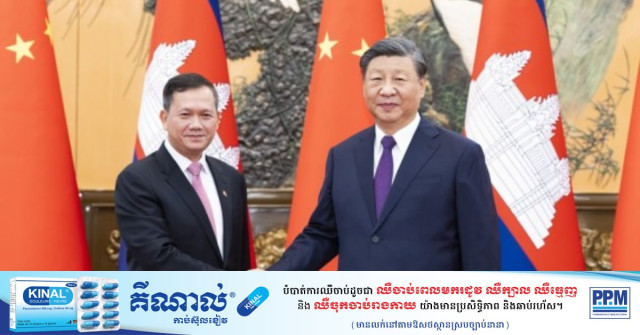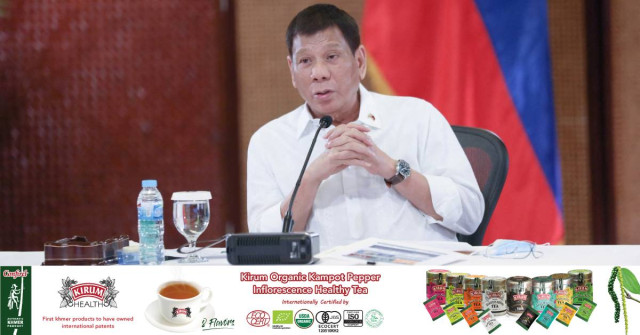Cambodia-China Eye Greater Trade Cooperation, Leave Politics Aside

- By Teng Yalirozy
- September 18, 2023 5:17 PM
PHNOM PENH – Prime Minister Hun Manet’s first official visit to China yielded trade and economic cooperation while little attention was paid to political discussions. Many documents related to greater economic cooperation were signed.
Hun Manet paid a three-day visit to China from Sept.14 to 16. He met with the head of the National People’s Congress Zhao Leji, Chinese Prime Minister Li Qiang, President Xi Jinping as well as a number of heads of Chinese international companies.
Jean-Francois Tain, minister delegate attached to the prime minister, in charge of Foreign Affairs and International Cooperation, said Cambodia and China mainly discussed potential cooperation on trade and investment.
“Both sides did not solely talk about politics. Around 70 percent of the discourse was centered on strategies of trade and economic partnership for mutual interest and improvement of the Cambodian people’s livelihood,” he said. “This shows that Cambodia is an independent and non-aligned country.”
Cambodian and Chinese prime ministers signed 15 documents, including an Action Plan for the Shared Future Community-Building 2024-2028 and a concessional loan agreement for a bridge project over the Tonle Bassac River, connecting Chak Angre Krom and Prek Pra, in the southernmost parts of Phnom Penh. Preliminary discussions were held in 2022 with Shanghai Construction Group to build the bridge.
But Hun Manet’s official visit to China was also a chance to meet with representatives from China Road and Bridge Corporation (CRBC) or Huawei Technology. Chinese companies intend to expand new investments in Cambodia as Hun Manet said he welcomed Chinese investors to study the potential of the country.
“The Fish and Rice Corridor” to boost agricultural trade
Cambodia’s prime minister and his Chinese counterparts aimed to accelerate the implementation of the fish and rice corridor, which was agreed upon in February 2023 during a meeting between ex-Premier Hun Sen and President Xi Jinping.
The corridor focuses on increasing the trade of agricultural products such as fish, rice, tropical fruit, vegetables, fertilizers, pesticides and animal feed between the two countries.
Spokesperson of the Agriculture Ministry Khim Finan said that the prime minister and the representative of the Chinese Agriculture Ministry signed a Memorandum of Understanding that formalized the creation of working groups dedicated to the project.
The corridor is located in the northwest of Cambodia and in the Tonle Sap Lake area, developing modern ecological agriculture near the Tonle Sap Lake.
“We want to push the establishment as fast as possible so that we can extract benefits for our farmers,” said Finan. “It will create an abundant market for our agricultural products.”
PM Hun Manet also requested technical assistance and cooperation on rice, cashew and fish farming.
“We will try our best to establish the corridor in the nearest future,” he said.
According to a joint statement released after the visit, the cooperation should also focus on aquaculture development, processing agriculture, ecological agriculture, modern machinery and technicality as well as human resources.
In the first eight months, trade volume between Cambodia and China reached $8 billion, a 1.1 percent increase compared to the same period in 2022, according to the trade statistics of the General Department of Custom and Excise.
Mutual Support
While it was his first trip to China as prime minister, Hun Manet reiterated his government’s support for the “One-China” policy, stepping into his father’s shoes, who has been one of Beijing's closest allies in Southeast Asia.
China expressed its support for Manet’s Pentagonal Strategy, which aims to build a robust Cambodia in the next 25 years.
Jean-Francois Tain said Cambodia is a country with a firm stand on independence which conforms to the international rules of the ASEAN and the United Nations.
“Today, Cambodian politics is not just about ideology as it was during the Cold War,” he said. “International relations focus on economic basis. Wherever there is a commercial interest, Cambodia must not hesitate to walk in.”
Both countries also inked the “Industrial and Technological Corridor” which will help transform Preah Sihanouk province into a model multi-purpose Special Economic Zone, dubbed a “second Shenzhen,” focusing on green development, the digital economy, new infrastructures, and cooperation on forest and wildlife.















